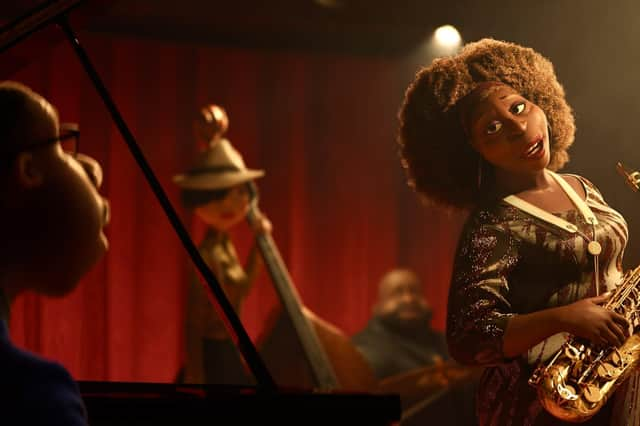Film review: Soul


Soul (PG) *****
As the lead director of Monsters Inc, Up and Inside Out, Pete Docter has emerged as the most visionary of the pioneering animation studio’s filmmakers, always willing to push the conceptual and intellectual bounds of what’s possible in a mainstream family movie. His latest, Soul, is no different. Co-directed by Kemp Powers, who also co-wrote the script with Docter and Mike Jones, it takes big themes – what happens when you die? What makes us who we are? What constitutes a full life? – and finds innovative, surprising and, as ever, emotionally true ways to explore them.
It’s built around a jazz pianist called Joe who’s reluctance to give up his dream of playing professionally and settle for a steady gig teaching music to primary school kids at first makes the film seem fairly rote. But the film quickly elevates this seemingly stock character to another realm, firstly by casting Jamie Foxx, whose sublime vocal performance riffs on his Oscar-winning turn in Ray, particularly in the way he captures the lost-in-music bliss Joe experiences whenever he’s playing, yet Foxx’s performance also brings to mind the vulnerability and uncertainty he demonstrated as the dream-delaying cab driver hero of Michael Mann’s Collateral.
Advertisement
Hide AdWith that part nailed, the film is free to take the first of several conceptual leaps, bumping off Joe en route to a potentially life-changing gig and condemning his soul to an afterlife of which he wants no part. Dedicating himself to actively escaping, he bluffs his way into a job mentoring a recalcitrant, yet-to-be-born soul called 22 (voiced by Tina Fey) and using this gig to cheat his way back onto Earth in ways too convoluted to explain here. What’s important is that 22’s soul ends up in Joe’s comatose body and Joe ends up in the therapy cat that hospital staff have left on his bed. Delightful body-swap shenanigans duly ensue as Joe tries to guide 22 across New York in time to play the aforementioned gig – and yet nothing that follows is exactly ordinary. Indeed, it’s frequently more complicated than it already sounds and yet it moves along so breezily – buoyed by Jon Batiste’s jazzy score in the New York scenes and Trent Reznor and Atticus Ross’s haunting electro score for the other-worldly scenes – that its deeper resonances hit you in a way great art often does: unexpectedly and with a force that’s sometimes difficult to explain.
A message from the Editor:
Thank you for reading this article. We're more reliant on your support than ever as the shift in consumer habits brought about by coronavirus impacts our advertisers.
If you haven't already, please consider supporting our trusted, fact-checked journalism by taking out a digital subscription at at https://www.scotsman.com/subscriptions
Joy Yates, Editorial Director